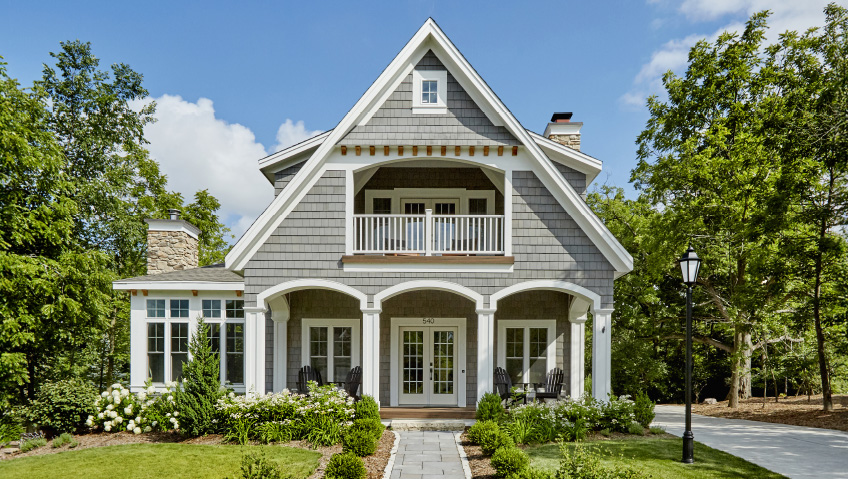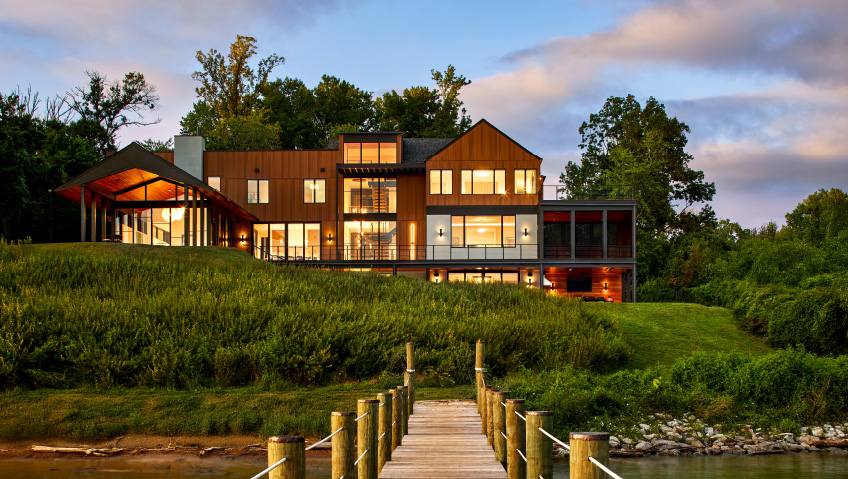When faced with a client who wanted to build a house dangerously near a cliff, the team at Miller Marriott Construction Co. did not blink.
“We have a reputation for being able to get our homes into unique pieces of property. It’s kind of fun for us,” says Kirsten Miller, President of the Delafield, Wisconsin-based design/build firm.
To make this particular site feasible, “we literally had to build a bridge from the garage to the house,” adds Chris Miller, owner, licensed contractor, and Kirsten’s husband.
Everything worked out in the end, and the project enhanced Miller Marriott’s reputation for taking on daunting tasks and building homes according to customer specifications.
Customized for the client
This company offers a wide array of services, with its design options falling into three main categories: custom, semi-custom, and classic. Custom projects are based on never-done-before, unique designs, while semi-custom projects involve some degree of modification to existing company plans, Kirsten explains. The classic category consists of homes based on one of the company’s existing plans.
“We started as just a custom builder, and we added semi-custom and classic to our product lines,” says Chris, who tells us around 80 percent of the company’s current workload falls into the custom category. Among such homes are the Lonestar, featuring five bedrooms and six bathrooms at 5,428 square feet, and the Grand Haven, which is an open-concept floor plan with a cedar shake exterior, lime wash fireplace, four bedrooms, 2.5 bathrooms, and 2,844 square feet of space.
In addition to offering fine craftsmanship and aesthetics, Miller Marriott prides itself on being customer friendly. Potential customers are connected to a client experience person who “makes sure they’re a good fit for us and we’re a good fit for them,” Chris says. “It’s important [that it is] mutually beneficial for both parties.”
If the fit works, detailed discussions can begin regarding aspects such as budget, costs, and project scope. Should the client want to build their home on land they already own, Chris, Kirsten and/or another company representative will visit the property to get a feel for the space. If the clients lack a building site, the company can guide them through the land selection and purchase process.
“Once the property has been identified and secured, the client enters into a design contract with us. Then, we’ll design the house and customize the interior selections,” says Chris. “We will truly listen to the client, understand their design goals, create a floor plan based on their lifestyle, and give a voice to their aesthetic style,” he states of custom work.
The design process can include the use of software to generate three-dimensional images of what the completed home will look like. If all goes to plan, the client signs a construction contract and their home gets built. The construction is led by Miller Marriott construction managers and completed by a cadre of trusted subcontractors, but Miller Marriott can take care of permits, surveys, paperwork, and other administrative duties. From start to finish, custom home construction takes about 18 months on average.
On occasion, Miller Marriott builds entire neighborhoods. As of late, these bigger projects have started to include infill neighborhoods where new homes are added to vacant or underused land. The company also offers full home remodeling.
The team has also completed apartment developments and select non-residential projects, such as a church rectory and a golf course clubhouse. Private homes, however, remain the company’s forte. Right now, the team is simply too busy to do much else, says Chris.
All told, the company has constructed more than 300 homes since it was founded. Approximately 90 percent of these residences are located within 15 miles of company headquarters. Many of its houses are built along the lakes that dot this part of the state and lakefront homes are a particular company sub-specialty.
Doing it better
Chris was motivated to launch the company in the late 1990s following a negative experience with a contractor. He hired the contractor to build him a home, but things quickly went sideways. The process “was a nightmare,” he recalls. “I just felt like, ‘Man, this could be done better.’”
A business owner himself at the time, Chris had an engineering degree from the University of Wisconsin-Madison and a background in construction. Annoyed by the difficulties he encountered with the contractor, he started building speculative homes—for resale without a specific buyer—in his time away from his day job, completing his first such house in 2004. “I started building spec homes, and people really liked what I was doing,” he says. “Then it morphed into who we are now.”
Miller Marriott Construction Co. continued to grow and in 2016, Chris left his corporate job to work at the firm full-time. Kirsten, whose résumé included experience with General Motors and General Electric, among other companies, joined full-time a year or so later.
Coming from corporate backgrounds, the couple understood the importance of “truly implementing a repeatable process that allows transparency with the client [and gives them] an early indication of what costs will be,” she notes.
As part of this mission to be transparent, architects take part in meetings where costs are discussed with custom-build clients. If the client has questions about how much a particular feature or material might cost, the architect is on hand to give an informed answer, explains Chris. Architects are responsible for selecting the materials for a build and making decisions on everything from the type of flooring to the thickness of insulation, and at all times, the customer needs to be on board with such choices and approve of the costs.
In addition to transparency, Miller Marriott offers a one-stop shop model. Clients do not need to seek out multiple different professionals, from architects to land developers to construction contractors, to build their dream home. And customers appreciate that Miller Marriott takes charge of the entire design/build process, says Kirsten. “I think for people that are considering building, who may have never built before, it can be intimidating, and they’re not necessarily sure where to start,” she says. “And we can help make it a little less intimidating.”
A team approach
The company currently employs 24 people. To join, one must possess the right technical skills for the sought-after position and be a good team player. A unified and strong team has been essential to the company’s success. A good team player might disagree on certain points with their colleagues but can express their views in a respectful manner while still working in a collaborative manner, says Chris.
“One thing we’ve learned in this business is no one person succeeds independently. It really takes a team rowing in the same direction to have a great experience for our client and build a quality home,” adds Kirsten.
The entire team prioritizes the client through the effort and care they put into their individual roles. Regular communication, listening to the client, and professional behavior is what is expected from the team.
To become part of the sub-contractor pool, a construction company must demonstrate capability, loyalty, a strong work ethic, and quality craftsmanship. Miller Marriott follows what are called preferred quality and build standards—verifiable construction benchmarks used industry-wide. These standards encompass everything from materials and construction methods to building codes, consistence in quality, and measures for energy efficiency. The company inspects its projects during construction and reports any issues back to the client.
This emphasis on clear communication is not only helpful for would-be homeowners; it is beneficial to the company’s bottom line. While Miller Marriott has a comprehensive website and robust social media presence, disseminating newsletters and occasionally hosting events at model homes, its promotion largely hinges on word-of-mouth recommendations from satisfied clients.
“I truly believe this is a referral business, and we relentlessly focus on making customers happy,” notes Chris.
Building community
The company is also determined to give back to its local community, which is why it launched the Miller Marriott Charitable Foundation. The foundation spearheaded a recent initiative to build a charity home. “Kirsten and I donated land and our design and construction services to create a home that we could sell and donate the profits from,” says Chris, with proceeds from the sale of the home going to specifically help mental health organizations.
Going forward, Chris and Kirsten are considering increasing the amount of remodeling work the firm does. They are also open to expanding the company’s market reach into new locations—but only if demand justifies such a move.
One thing that will not change is Miller Marriott’s reputation for designing and building beautiful homes in all manner of settings. “We’re truly custom—our processes, our homes, and our neighborhoods,” says Chris. “We can take very unique lots and land conditions and competitively design a beautiful neighborhood or home for someone.”






